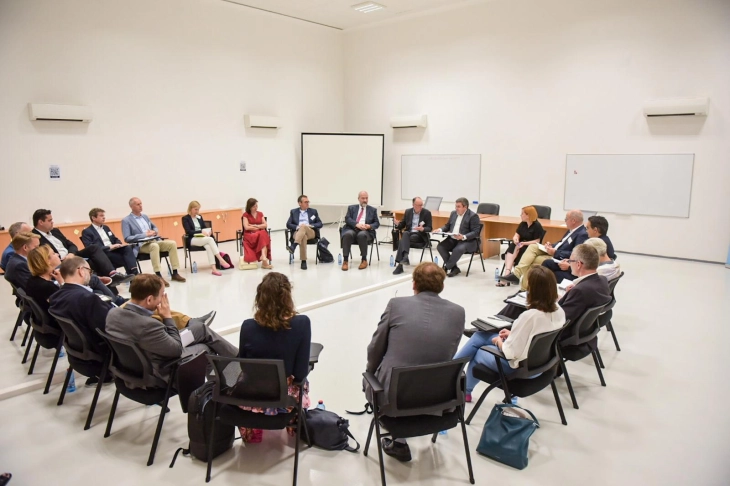Marichikj meets German officials: We have a perspective, we must maintain it
- Post By Nevenka Nikolik
- 18:13, 27 June, 2022

Skopje, 27 June 2022 (MIA) – Deputy PM for European Affairs Bojan Marichikj met with participants in the Federal Academy for Security Policy 2022 at the Secretariat for European Affairs on Monday.
Talks with the German officials focused on the impact on the European security architecture. In his welcome speech, Deputy PM Marichikj stressed that the Balkans and the EU have a common perspective that must be maintained.
“The Balkans has always been a key region for the security of Europe. We must not allow to have this “status quo” feeding the soil of the Western Balkans with nationalism, destabilization and new alternatives. It’s clear that the European Union as leader is no longer alone. The formula to maintain the EU’s position as a leader on the geopolitical map is enlargement,” said Marichikj, as cited in the Secretariat for European Affairs’ press release.
He added that the war in Ukraine and its effect on the region now remains a major concern for the citizens of the Balkans and they will have to bear the burden of the crisis, which will surely be a burden in the coming years for both the EU and the Western Balkans.
“The time of light and enjoyable debates on European policies is long gone. We now need a common response to the global challenges we face. Instability of the region will mean instability of Europe. Now it is no longer a matter of enlargement, but it is a matter of security,” Marichikj said.
The Deputy PM stressed that today was the best time to understand the essence and the meaning of NATO membership, adding that NATO is extremely important for the Western Balkans region, for Europe as well, and particularly for stability and future prosperity.
Deputy Ambassador and Head of the Economic Department at the Embassy of Germany, Otto Graf, also attended the meeting.
The Security Policy Course for Senior Officials consists of three phases: in the first part of the course participants explore the historical, cultural, political and economic background of the Western Balkans and discuss about current developments with experts.
The second part of the course, reads the press release, includes forming the basis for discussions with further experts and decision makers in the region, i.e. in Sarajevo, Belgrade, Skopje and Pristina. In the third part of the course, participants once again critically review their positions and complete the course in a discussion with national high level decision makers about which positions and strategies Germany and Europe should adopt and follow through in terms of the Balkans in the future.
Organisationally, the Federal Academy for Security Policy falls within the area of responsibility of the Federal Ministry of Defence. The President of the Academy is Ambassador Ekkehard Brose. The Federal Academy for Security Policy has some 70 employees, coming from all ministries represented in the Federal Security Council, and was founded in Bonn in 1992. It has been based on the premises of Schönhausen Palace in Berlin since 2004.







